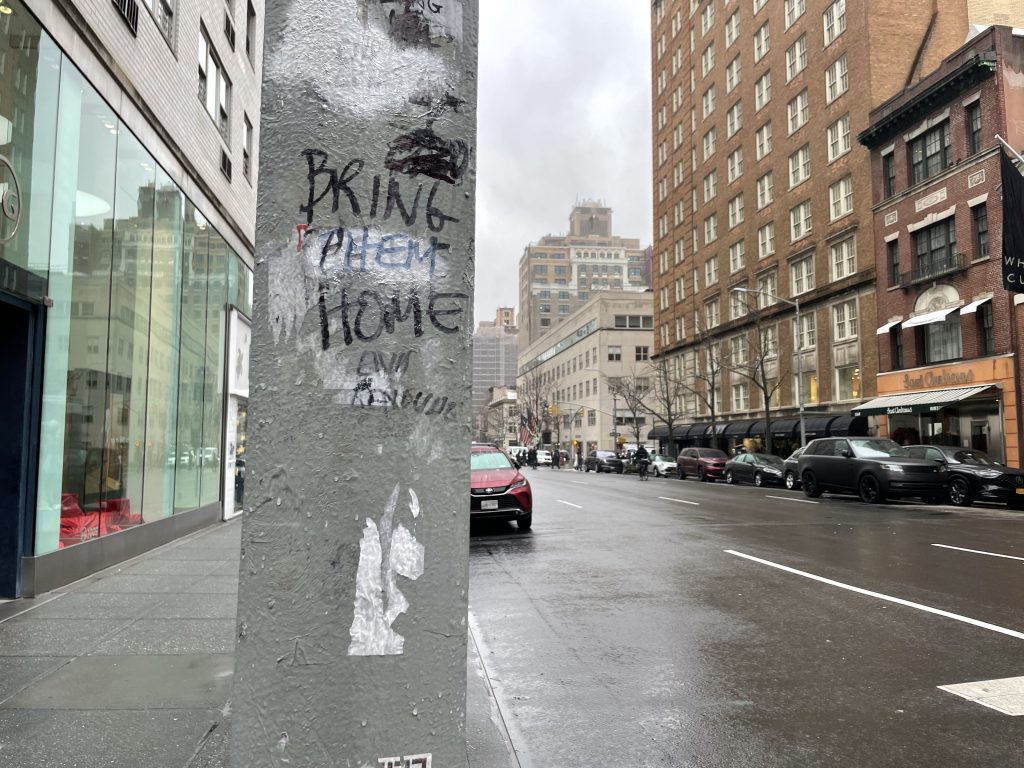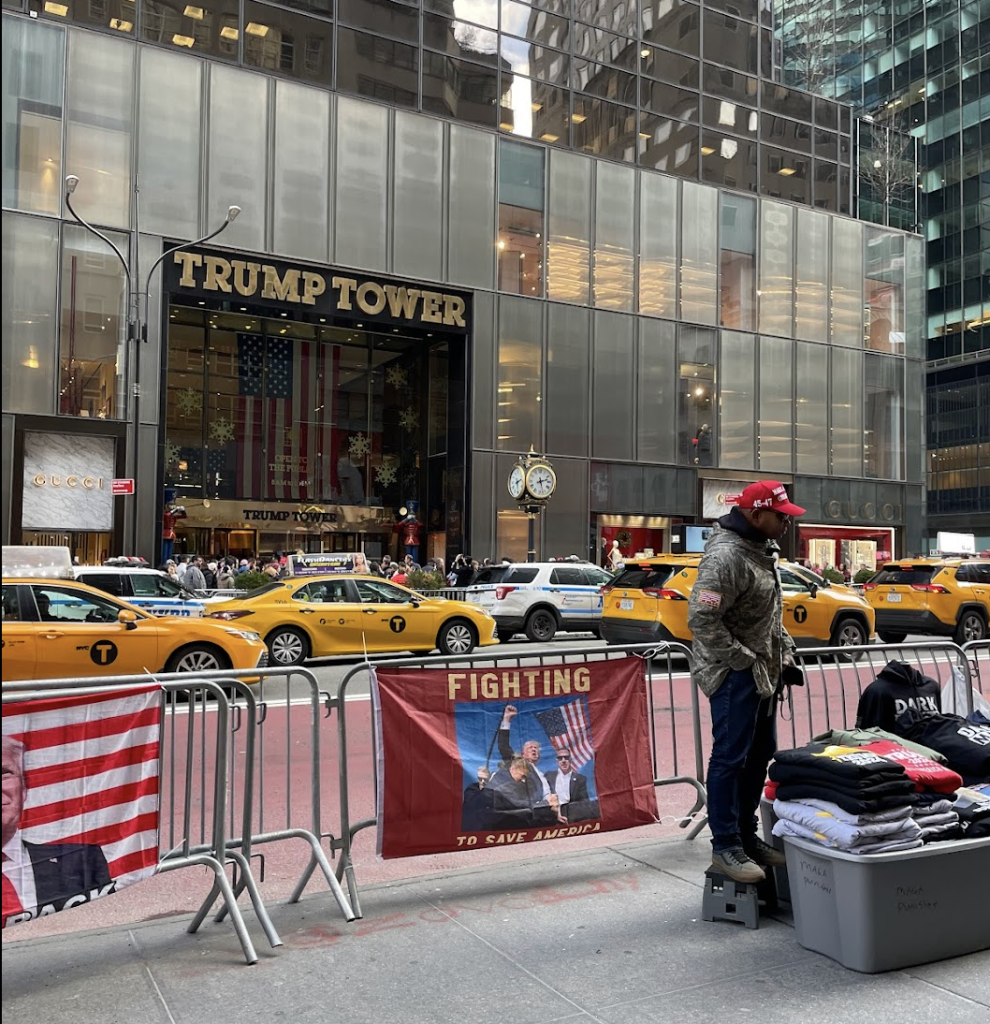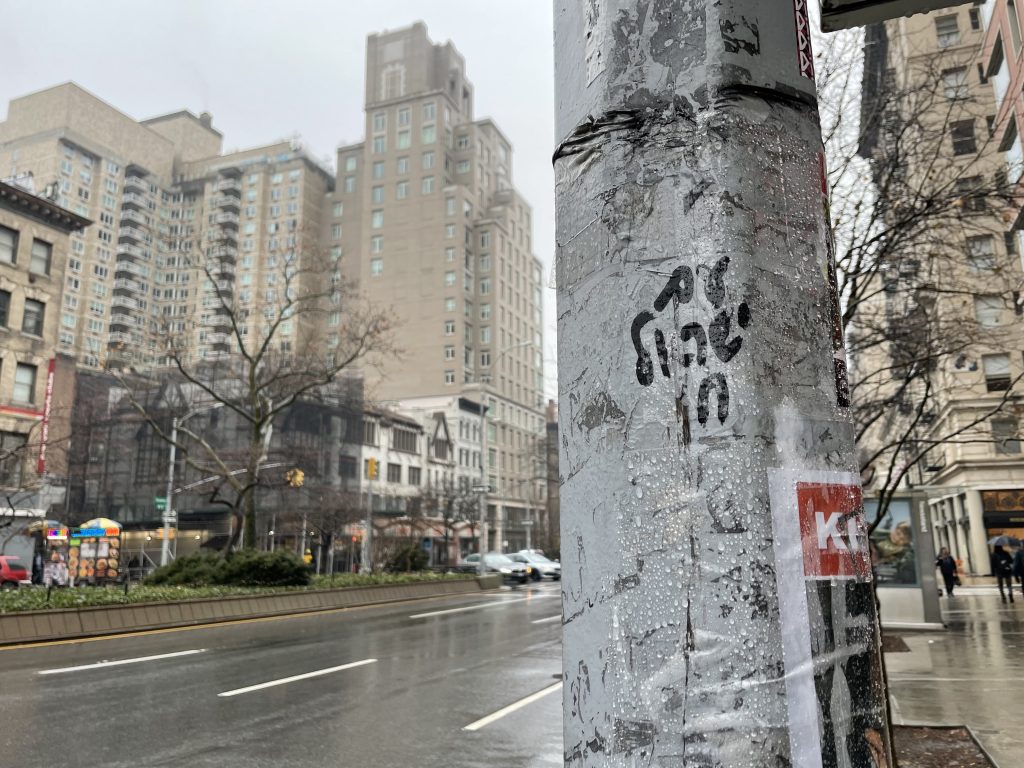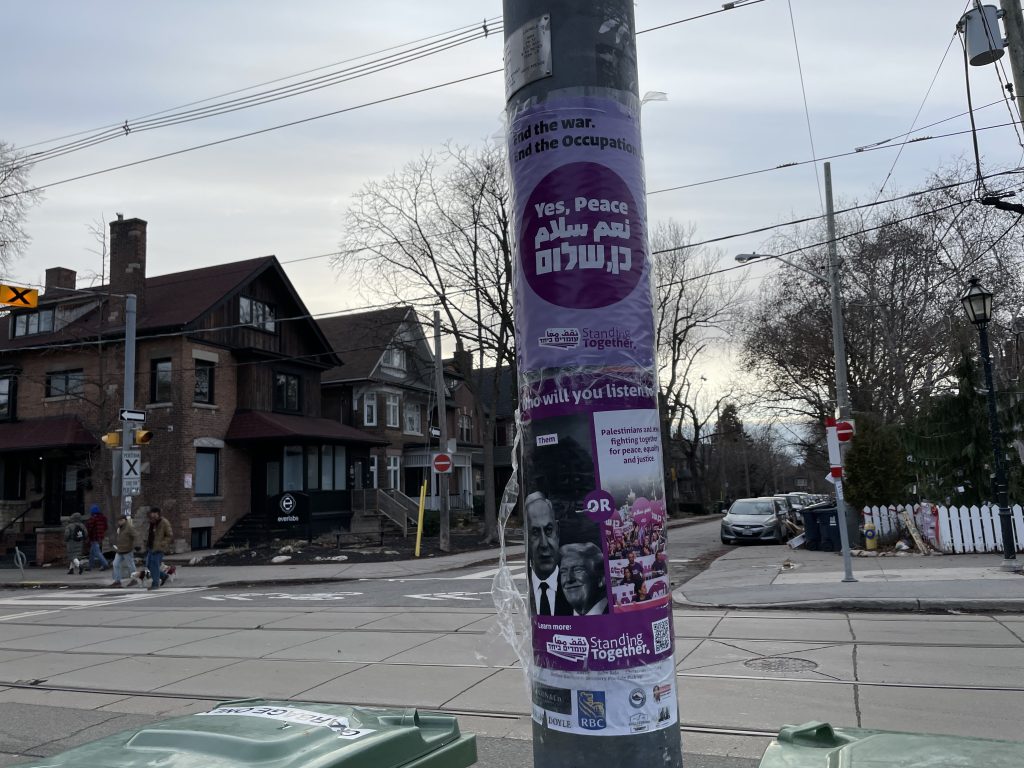RSS
New York was always a lot more Jewish than Toronto could ever be—but the contrast is more obvious now
It’s a commonplace experience of a Diaspora Jew visiting Israel to realize that suddenly, this thing that made you different is actually the least remarkable thing about you.
The character Alexander Portnoy speaks to this in Philip Roth’s novel Portnoy’s Complaint—but I’ve also just lived it when visiting Tel Aviv or Rehovot or wherever. Whether you experience it as being Othered in a bad way or as a point of pride and what makes you special, you get to Israel and lo and behold, no one is surprised that your family doesn’t celebrate Christmas or whatever. Streets are named after Jewish figures, businesses are closed on Jewish holidays, Jewishness is assumed, so distinctiveness requires other sources. Being Jewish isn’t associated with being this way or that—not with being neurotic or good with money—because Jews are everywhere you look. The bimbos and himbos are Jewish, too.
So it took me by surprise, visiting my hometown of New York City over the holiday break, to feel a bit, well, Israel-visit-ish while there. It’s not that everyone is Jewish (nor, for that matter, is everybody Jewish in Israel), but rather that there’s just some crucial difference in population and culture such that it is not a whole thing to be Jewish in post-Oct. 7 New York, not in the way it is in Toronto. Goodness knows that relative to plenty of places, Toronto’s got Jews. But it is, at most, a city with some Jewish areas. We’re Canadian, sure, but one of the city’s many Others.

The streets of Manhattan are not lined with signage admonishing passersby to reflect on Israel’s misdeeds. You can walk for blocks or even days on end and not see a keffiyeh, not because the United States bans free expression but because the interest just isn’t there. The little that remained of post-Oct. 7 signage was more in the hostage-freeing realm than the other sort.
But there isn’t a tremendous amount of pro-Israel this-and-that, either. (I saw maybe one baseball cap expressing support for Israel?) It’s more like, look at all the shiny things you can buy in America, and particularly in Manhattan, so have at it! Shiny things and, uh, MAGA-wear.

But there’s an underlying Jewishness that’s just so much in the air you wouldn’t notice it if it’s part of your everyday life. There are the old standbys (food shops like Zabar’s, etc.) but also newcomers. Breads Bakery is not that new, but it’s newly ubiquitous, and unambiguously, unapologetically Jewish, from the Happy Challahdays signage to the sufganiyot labeled as such. In corporate lobbies and whatnot, no Christmas tree lacks an accompanying menorah. This is not because ‘woke’ or whatever, it’s not a war on Christmas, it’s what the population demands. I heard no shortage of Hebrew.
This is not about better or worse; I am describing the world as it is. Not to suggest anyone up and move (not a trivial thing, even for dual citizens) in either direction. And the thing I experience when I walk out the door in Toronto, where the fact that I’m Jewish is this whole thing, one that is interpreted by some as a prompt for theses on geo-politics that I simply don’t have, is not one in New York, where Jewish is among many unremarkable ways to be. So, Phoebe, you’re Jewish, what’s that about? In New York, no one thinks to start that conversation. Fine not no one, it depends the environment, but it wouldn’t be nearly as regular an occurrence.
Whereas a man in Zabar’s told me that he went to school with the store’s founder, what would have been about 70 years ago. Why did he tell me this? Because it’s what you do while you wait for lox, you tell the person standing next to you your life story. Torontonians would never. We’re too busy not talking to people to whom we haven’t been formally introduced, or, I guess, sorting out the Middle East by leaving what are, in effect, passive-aggressive notes. On the plus side, we can buy our groceries without anyone chatting with us, if we’re not feeling it that day.

Mainly, though, I did not experience public space as a demand to form a coherent position on Middle East politics. This is not because the city lacks anyone who ponders such things (Columbia University is located in Manhattan) but because there’s a level of Jewish presence—or, even in Manhattan, American conservatism—that acts as a buffer against the flags-flyers-keffiyehs blanketing of public space. It struck me the moment I was back in Toronto just how visible the conflict is, including—if less so, in Roncesvalles Village—the pro-Israel side of things.

While I was there, I kept thinking: what are the authors of the anthology On Being Jewish Now, clustered as they are in the part of NYC I come from, experiencing? Or rather, how would they react to so much as five minutes anywhere other than the Upper East or West Sides? Places where a kind of secular-ish cultural Jewishness is so entrenched that you don’t ever really think you’re alone in believing, for example, that Israelis are human beings and not evil abstractions. It started to make sense why so many of the tensions they describe occurred online. I suppose that’s how it goes in areas where you can go to the local coffee shop and forget all that stuff.
The thing one says about Israel is that its existence makes Jews elsewhere safer, even ones who have no interest in packing up and moving there. Can the same be said of New York? Unclear. All I can say with confidence is that I spent what would amount to a zillion Canadian dollars over the course of a few days on the excellent pastries from Breads Bakery.
The CJN’s opinion editor Phoebe Maltz Bovy can be reached at pbovy@thecjn.ca, not to mention @phoebebovy on Bluesky, and @bovymaltz on X. She is also on The CJN’s weekly podcast Bonjour Chai. For more opinions about Jewish culture wars, subscribe to the free Bonjour Chai newsletter on Substack.
The post New York was always a lot more Jewish than Toronto could ever be—but the contrast is more obvious now appeared first on The Canadian Jewish News.
RSS
After False Dawns, Gazans Hope Trump Will Force End to Two-Year-Old War

Palestinians walk past a residential building destroyed in previous Israeli strikes, after Hamas agreed to release hostages and accept some other terms in a US plan to end the war, in Nuseirat, central Gaza Strip October 4, 2025. Photo: REUTERS/Mahmoud Issa
Exhausted Palestinians in Gaza clung to hopes on Saturday that US President Donald Trump would keep up pressure on Israel to end a two-year-old war that has killed tens of thousands and displaced the entire population of more than two million.
Hamas’ declaration that it was ready to hand over hostages and accept some terms of Trump’s plan to end the conflict while calling for more talks on several key issues was greeted with relief in the enclave, where most homes are now in ruins.
“It’s happy news, it saves those who are still alive,” said 32-year-old Saoud Qarneyta, reacting to Hamas’ response and Trump’s intervention. “This is enough. Houses have been damaged, everything has been damaged, what is left? Nothing.”
GAZAN RESIDENT HOPES ‘WE WILL BE DONE WITH WARS’
Ismail Zayda, 40, a father of three, displaced from a suburb in northern Gaza City where Israel launched a full-scale ground operation last month, said: “We want President Trump to keep pushing for an end to the war, if this chance is lost, it means that Gaza City will be destroyed by Israel and we might not survive.
“Enough, two years of bombardment, death and starvation. Enough,” he told Reuters on a social media chat.
“God willing this will be the last war. We will hopefully be done with the wars,” said 59-year-old Ali Ahmad, speaking in one of the tented camps where most Palestinians now live.
“We urge all sides not to backtrack. Every day of delay costs lives in Gaza, it is not just time wasted, lives get wasted too,” said Tamer Al-Burai, a Gaza City businessman displaced with members of his family in central Gaza Strip.
After two previous ceasefires — one near the start of the war and another earlier this year — lasted only a few weeks, he said; “I am very optimistic this time, maybe Trump’s seeking to be remembered as a man of peace, will bring us real peace this time.”
RESIDENT WORRIES THAT NETANYAHU WILL ‘SABOTAGE’ DEAL
Some voiced hopes of returning to their homes, but the Israeli military issued a fresh warning to Gazans on Saturday to stay out of Gaza City, describing it as a “dangerous combat zone.”
Gazans have faced previous false dawns during the past two years, when Trump and others declared at several points during on-off negotiations between Hamas, Israel and Arab and US mediators that a deal was close, only for war to rage on.
“Will it happen? Can we trust Trump? Maybe we trust Trump, but will Netanyahu abide this time? He has always sabotaged everything and continued the war. I hope he ends it now,” said Aya, 31, who was displaced with her family to Deir Al-Balah in the central Gaza Strip.
She added: “Maybe there is a chance the war ends at October 7, two years after it began.”
RSS
Mass Rally in Rome on Fourth Day of Italy’s Pro-Palestinian Protests

A Pro-Palestinian demonstrator waves a Palestinian flag during a national protest for Gaza in Rome, Italy, October 4, 2025. Photo: REUTERS/Claudia Greco
Large crowds assembled in central Rome on Saturday for the fourth straight day of protests in Italy since Israel intercepted an international flotilla trying to deliver aid to Gaza, and detained its activists.
People holding banners and Palestinian flags, chanting “Free Palestine” and other slogans, filed past the Colosseum, taking part in a march that organizers hoped would attract at least 1 million people.
“I’m here with a lot of other friends because I think it is important for us all to mobilize individually,” Francesco Galtieri, a 65-year-old musician from Rome, said. “If we don’t all mobilize, then nothing will change.”
Since Israel started blocking the flotilla late on Wednesday, protests have sprung up across Europe and in other parts of the world, but in Italy they have been a daily occurrence, in multiple cities.
On Friday, unions called a general strike in support of the flotilla, with demonstrations across the country that attracted more than 2 million, according to organizers. The interior ministry estimated attendance at around 400,000.
Italy’s right-wing government has been critical of the protests, with Prime Minister Giorgia Meloni suggesting that people would skip work for Gaza just as an excuse for a longer weekend break.
On Saturday, Meloni blamed protesters for insulting graffiti that appeared on a statue of the late Pope John Paul II outside Rome’s main train station, where Pro-Palestinian groups have been holding a protest picket.
“They say they are taking to the streets for peace, but then they insult the memory of a man who was a true defender and builder of peace. A shameful act committed by people blinded by ideology,” she said in a statement.
Israel launched its Gaza offensive after Hamas terrorists staged a cross border attack on October 7, 2023, killing some 1,200 people and taking 251 people hostage.
RSS
Hamas Says It Agrees to Release All Israeli Hostages Under Trump Gaza Plan

Smoke rises during an Israeli military operation in Gaza City, as seen from the central Gaza Strip, October 2, 2025. Photo: REUTERS/Dawoud Abu Alkas
Hamas said on Friday it had agreed to release all Israeli hostages, alive or dead, under the terms of US President Donald Trump’s Gaza proposal, and signaled readiness to immediately enter mediated negotiations to discuss the details.


